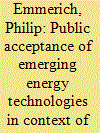|
|
|
Sort Order |
|
|
|
Items / Page
|
|
|
|
|
|
|
| Srl | Item |
| 1 |
ID:
127611


|
|
|
|
|
| Publication |
2013.
|
| Summary/Abstract |
The author analyzes the ethnocultural and psychological factors contributing to the continued ethnic tension in Kyrgyzstan in the post-conflict period. These factors figured prominently in the flare-ups of ethnic tension and continued ethnic strain. Dr. Chotaeva proceeds from the results of an ethnosociological survey carried out in five regions of Kyrgyzstan.
The ethnocultural factors are related to various aspects of ethnic identity-the extent to which the family and close relatives affect ethnic self-identity and the degree to which the survey respondents were familiar with their ethnic history and follow ethnic traditions and customs in everyday life. The psychological factors were determined by the degree of trust the members of one ethnic group feel toward another.
The sociological survey also included questions designed to identify the respondents' civic identity, which directly depends on the degree to which the republic's ethnic groups are integrated and which, on the other hand, is slowed down by ethnic and regional specifics. The continued ethnic tension has intensified an awareness of ethnic identity; however the sociological survey demonstrated that a common civic identity still prevails over ethnic identity. The absolute majority of the respondents consider themselves to be citizens of Kyrgyzstan and are not contemplating emigration.
|
|
|
|
|
|
|
|
|
|
|
|
|
|
|
|
| 2 |
ID:
140089


|
|
|
| 3 |
ID:
176806


|
|
|
|
|
| Summary/Abstract |
Technology acceptance represents a challenge for the successful implementation of emerging energy technologies. Building on previous literature, we developed and assessed a socio-psychological factor model, which we apply to three different energy technologies that are relevant to the German energy transition. Our model analyses factors such as trust in industry, trust in municipalities, perceived problems of the current energy system and environmental self-identity with regard to acceptance both in general (general acceptance) and in the context of a scenario featuring a nearby implementation (local acceptance). These factors are mediated by affect and perceived effects, including perceived benefits, costs and risks. We tested the applicability of our model across three different energy technologies: hydrogen fuel stations, biofuel production plants and stationary battery storage facilities. Our study confirms previous findings, which stress the relevance of psychological and social factors. It also extends the literature, testing a universal model across different technologies and examining acceptance on both the local and the general level. We explored the implications of our findings for the selected technologies and managerial practice.
|
|
|
|
|
|
|
|
|
|
|
|
|
|
|
|
| 4 |
ID:
150912


|
|
|
|
|
| Summary/Abstract |
This research explores the possibilities for further energy saving in households in the Chinese context by conducting of a survey on energy curtailment behaviors. We examine how people's demographic characteristics and psychological factors affect their direct and indirect energy curtailment behaviors at home, as well as the different effects of these antecedents. Results suggest that people with high sense of environmental responsibility and curtailment attitude are more likely to engage in both direct and indirect energy curtailment actions. Generally, indirect energy curtailment behavior is more strongly related to psychological and socio-demographic factors than direct behavior, and these socio-demographic factors vary for direct and indirect behaviors. Interesting patterns emerged with respect to gender, age, family structure, family income, and level of education. Results indicate that strengthening publicity and education to increase environmental awareness among Chinese urban residents would be effective in reducing household energy consumption, especially when the said measures target a specific population and specific behaviors.
|
|
|
|
|
|
|
|
|
|
|
|
|
|
|
|
| 5 |
ID:
112313


|
|
|
|
|
| Publication |
2012.
|
| Summary/Abstract |
This study explores factors associated with the individual's appraisal of anticipated environmental changes caused by energy production facilities. The study took place in a Swedish village where exploratory drilling, that could eventually lead to a uranium mine, was being conducted at the same time as a wind farm was approved. Results from the survey, which included the total population, were interpreted in the light of cognitive stress theory. Most residents thought that the wind farm would have a positive impact on the village but that the uranium drilling would have a negative impact; these opinions were closely related to attitudes towards wind and nuclear power. Perceiving the wind farm as positive was further predicted by young age, high education, being an ordinary rather than a committed recycler and having attended a meeting about the wind farm. A negative view of uranium drilling was predicted by the individual valuing closeness to nature, being a recycler, and having attended the uranium meeting. Psychological factors such as concerns for the environment (manifested as pro-environmental behaviour), valuing closeness to nature, and involvement impinge on the appraisal process and should be considered when new developments are presented.
|
|
|
|
|
|
|
|
|
|
|
|
|
|
|
|
|
|
|
|
|